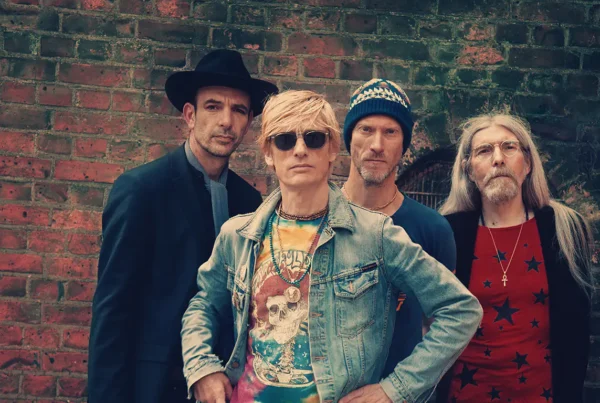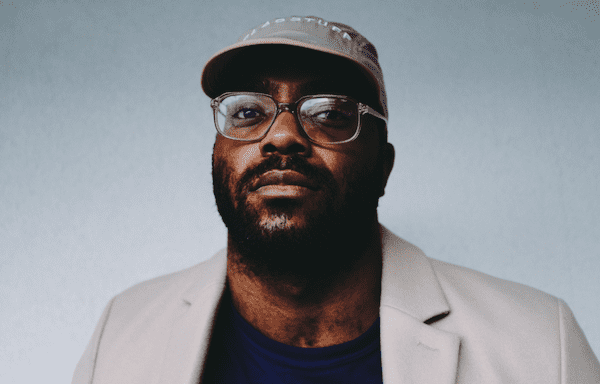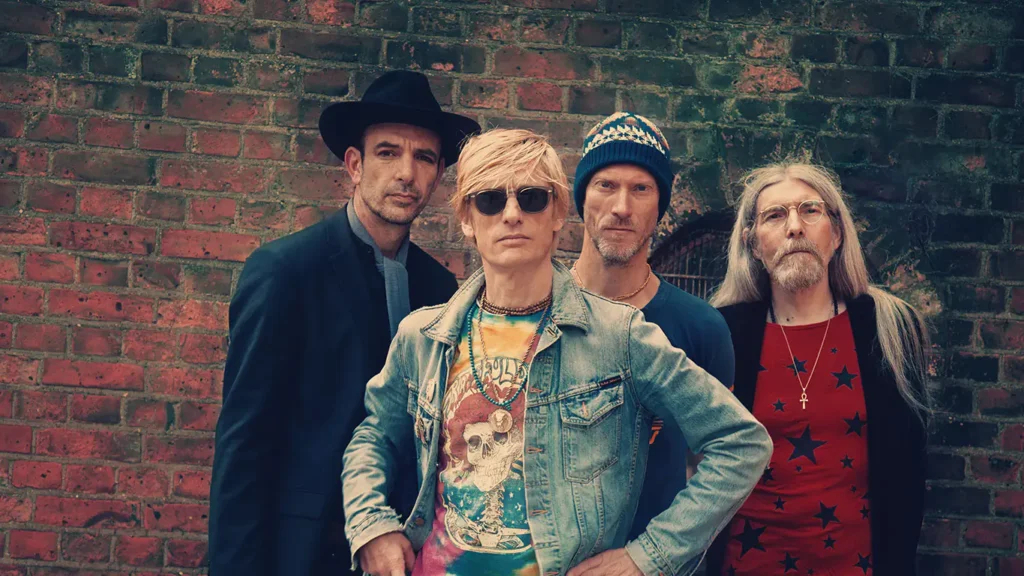Scott Stapp is a creative who is ever-evolving. The American singer-songwriter’s inauguration began with the long-adored rock band Creed, whose pensive melodies and weighty, anthemic instrumentals were the perfect breeding ground for his emotive lyrics. Since the band’s global success, Stapp has pursued performing hard rock supergroup Art of Anarchy – not to mention an illustrious solo career. His latest record, The Space Between the Shadows, is a reflective collection, loaded with social commentary foregrounded by dystopic guitar licks and drums beating upon the ears like hellfire. Soundsphere Magazine’s editor, Dom Smith, sat down to talk about the inspirations and challenges that gave rise to this gold-standard album.
DS: So, for me, obviously a new record has just come out, you’ve been doing a lot of stuff over the last few years. I wanted to talk to you about the kind of things that are motivating you outside of music. You know, people, places – specific things, because a lot of people are inspired by your work but might not know what kinds of things influence you outside of that musical sphere.
SS: I think the number one motivator in my life is my wife and my children. Outside of music, spending time with my kids is where I spend 99% of my time: their schooling, their sports, their music. I’m just wrapped up in their lives, being an involved parent. Occasionally, I’ll also fit in a round of golf, which I love.
DS: One thing that we’re speaking to people about at the moment – particularly people of your reputation who have achieved a certain amount but also faced struggles themselves – is success, and the definition of it. On a global scale, you’ve accomplished a lot of things. How do you define success, and what does it mean to you?
SS: It has changed, in my life. Success, today, for me, is all about my wife and my kids. Having my family is my greatest accomplishment at this point. If I were to just focus on music and my career, success for me is being here, still making music, still having those who are connecting with my music and coming to shows all over the world 25 years down the line. I’m grateful for that.
DS: That’s incredible. A lot of my friends, and people I grew up with still love the music that you’ve been able to make. Obviously, I remember growing up on that music, so it must be really cool to hear stories from people around the world who have been touched by your voice and the projects that you’ve been involved with. One thing I wanted to talk to you about – before we go on to talk about the record itself – is mental health. It’s a big topic on a global scale at the moment; you’ve had to overcome a lot of things, using your faith and your music as a motivator. I had a question sent to me for you from someone who had dealt with suicidal thoughts, and had used your music and solo stuff as a motivator to survive. So, I wanted to ask you, what kind of advice would you give to someone – regardless of what they’re struggling with – on how to overcome the challenges they face just like you have been able to?
SS: Don’t suffer in silence. Don’t keep it to yourself and think that you can fight your way through it, self-medicate your way through it. It’s not your fault – get help. Go to your physician. Say, ‘I need help. This is what’s going on’. You’re fighting for your life. Go to a friend or a family member – anyone that you trust, and be sincere. Let them know that you need help, and you need it now. There are also many resources online now, where someone is available 24 hours a day who you can connect with. They can put you in touch with a facility that you can go to immediately. Even if you have to go to the emergency room and share with a nurse, don’t be afraid, don’t be ashamed, don’t be embarrassed. You can get through it, but you can’t do it alone and you can’t keep it quiet.
DS: Absolutely. That’s a really positive message, which is one the things I really wanted to discuss with you. You’ve always been a strong motivator for people. Moving onto the record, it has been out for a while now and it looks like it has been doing fantastic. Obviously, you’ve got your background with Creed, but you’ve also got The Proof of Life and before that, The Great Divide which was a great success for you. Some people might think you’ve done everything; it’s not hard for you make a record anymore because you’re so used to it. Before we talk about specific songs, I wanted to know how the record as a whole has pushed in new ways as an artist?
SS: The mindset that I had when I approached this album was to reconnect with my roots and the core of my sound, but in a modern, 2019 way. I really set out, both musically and sonically, to not make a record that my fans and those who may be exposed to it, would hear and think ‘That sounds like something which came out in the 2000s’. The intention was to really bring myself forward into the present and evolve musically, and I really feel like I accomplished that with a wide variety of sonic and musical methods. I experimented with things I’ve never tried before on records with certain songs, and in other areas, brought the sound into the present. I think lyrically, I really sought out to speak out with as much clarity and candidness. Early on in my career, I would often hide behind analogy or poetry, and I think looking back that was two things: an excuse in not being able to fully communicate my point with clarity, and the other was fear; fear of speaking my truth. I really make a conscious effort to get a point of clarity. I feel like I accomplished that, lyrically. I shared with the intent of connecting with people. I’m very excited about this new record, and excited to continue this journey with this album.
DS: You talked about speaking your truth. Everything that you’ve done is very honest, at least to my ear – and thank you very much for sharing that you’ve hid behind poetry in the past – with this record being out, do you find music cathartic in the same way you did when you started? Obviously, you’re a very different person to who you were when you came out all those years ago.
SS: Yes. Absolutely. It has helped me to process life: my interpretation of life, my own personal experiences, my highs, my lows, my pain. It’s just as cathartic to me as it was when I started.
DS: I wanted to ask you a couple of questions about the tracks on the record. They’re all really cool – I listened to it last night and this morning. You talked a little about the experimentation you used, and I wanted to talk to you about “The World I Used to Know” first, and then “Red Clouds”, as well. Could you talk to me a little bit about the process of developing those two tracks in the context of the record and the kind of things that were inspiring you?
SS: It’s funny how “The World I Used to Know” started. It began as an entirely different song, with a different chorus. I was so excited that I was going into the studio and getting started with all these ideas I’d collected over the course of five years, and then I started going through them and realised that these were all things that were snapshots of this development and process to clarity – they’re not where I am now. I realised I’m in here, ready to make a record, and I’m starting from scratch today. A little trepidation came over me. I built myself a little creative block, and I think it was made from fear. Instead of letting that make me leave the studio and go and sit and think of where to start, I tried to embrace that feeling. I wrote a song where the first line of the chorus was, “Where are you now when I need you most?” and I was referring to my youth and my source of creativity. So that song was written, I demoed it, and I came back the next day with the same kind of feeling. I came up with the lyrics for “The World I Used to Know”, again, searching for that creative muse. What started out as me searching for that inspiration would then take on a life of its own. I began to feel free, and my subconscious began to flow, and that’s how the song began to evolve: ‘Okay, here’s who I am, and here’s how I’m viewing the world’. Then the lyrics were born, which is where the social commentary came in and the walls came down, creatively. Everything that was buried deep within me began to express itself. I love playing that song live. It really connects with the fans. I thought it was a great way to open the record too.
DS: The social commentary is definitely in there. It flows throughout, and seems to be one that people are really identifying with. “Red Clouds” was another one I wanted to talk about.
SS: “Red Clouds”, again, initially started out as a cry to my creator – my source of inspiration. ‘Red’ symbolises passion; energy; love. Also, it can also symbolise anger. But for me, I was crying out for that muse, initially, to give me inspiration. It was like a prayer. As the chorus came to me, then the song began to evolve. It’s really one of my favourite tracks on the record. I approached verses wanting them to have this vibe and this groove. Again, I wanted to speak my truth; I wanted it to have a social commentary element to it. The chorus evolved into letting passion, energy and love rain down upon us in these difficult times. “World” and “Red Cloud” were two of the first songs I wrote, and came from the same place of wanting my soul and subconscious to open up and begin to spill. I tend to write in a stream-of-conscious place. I don’t usually have concepts behind my music, but there were a couple of songs that do because something has inspired me. A lot of the songs I’ve written in my career, and these two in particular, are written in the moment. Once the song develops, it begins to get a life of its own. Once “Red Clouds” had been born, I wanted to present it in this epic way, because I really felt like musically it needed to feel and evoke the same feeling that the lyrics were bringing to the table. I’m really proud of that song.
DS: Definitely. That song really spoke to me. In the time that we’ve got left, I really wanted to speak to you about what advice you’d give to aspiring artists who want to make a dent on both a global or local scale as you have in the past?
SS: From a song writing perspective, I would say speak your truth, and be authentic. From my standpoint, I always intend to try to incite a feeling and connect with people through my music. I want the listener to have a visceral response to my music that I’m creating. That’s just my approach. Presenting your truth with passion helps people to bridge that gap and make that connection. When you record the music, you have to be sure that is a solid presentation – take your time. With Creed, we all pooled our money in at the beginning: $100 a week for months and months and months so we could go into the studio and make a real, professional, quality recording. At that point, we didn’t have a record deal and hadn’t even performed at more than five shows. It’s so important, if you want to do this, to record your music properly.
DS: Thank you very much for sharing those thoughts. I think people often forget about recording and studio time – as well as the fact that you guys were in that position once as well.
SS: Again, we hadn’t even played five shows at that point. We’d only written thirteen songs and we went in and recorded ten of them – that became our first record. We were committed: an authentic, organic band. We were four friends who knew what we wanted to do, and made the sacrifices that we had to make to follow our passion. You have to patient. The quality of those recordings is what lead us to an eventual record deal and made us a global success.
DS: Absolutely. That formula as repeated itself. I appreciate you’re a busy person, so thank you very much for your time. I hope it continues to go really well for you!






